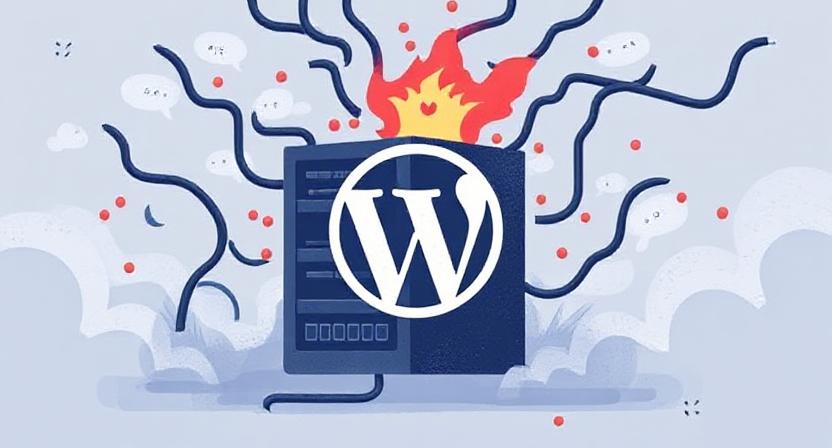WordPress powers over 43% of all websites globally, including millions in India. Its popularity stems from ease of use, customisation, and scalability. However, the growing dominance of WordPress has also made it a prime target for cyberattacks. Traditional hosting defenses, once considered enough to safeguard websites, are proving insufficient against evolving threats. This article explores why standard hosting protections are falling short, the rising risks for WordPress websites, and what Indian website owners can do to secure their digital presence.
Why WordPress Security Matters
- Largest CMS globally – more than 455 million sites run on WordPress.
- Attractive target for hackers – from phishing campaigns to malware injections.
- Business impact – A hacked site can result in data loss, revenue loss, reputational damage, and penalties for non-compliance.
Fact: According to a report by Sucuri, over 90% of all hacked CMS platforms in 2023 were WordPress sites.
Limitations of Traditional Hosting Defenses
Traditional hosting providers usually include firewalls, antivirus software, and server-level monitoring. While useful, these defenses often fail to address the unique risks WordPress sites face.
1. Lack of Application-Level Protection
Most hosting solutions focus on server health, not the CMS running on it. Vulnerabilities in plugins, themes, and outdated WordPress versions often go unnoticed.
2. Shared Hosting Risks
Many Indian small businesses opt for affordable shared hosting. Unfortunately, if one site gets infected, neighbouring websites on the same server are at risk.
3. Limited Patch Management
Hosting providers secure their servers, but responsibility for updating WordPress core, plugins, and themes lies with the site owner. Missed updates create backdoors for attackers.
4. Insufficient Malware Detection
Traditional malware scanners may not identify sophisticated backdoors or injected code hidden in WordPress files.
Common WordPress Security Risks
| Threat | Impact |
|---|---|
| Outdated Plugins & Themes | Hackers exploit vulnerabilities to gain access |
| Brute Force Attacks | Automated bots try thousands of login combinations |
| SQL Injections | Attackers manipulate database queries to steal data |
| Cross-Site Scripting (XSS) | Malicious scripts injected into site pages |
| Malware & Ransomware | Website files encrypted or replaced with malicious code |
Real-World Examples in India
- E-commerce stores using WooCommerce have been hit with credit card skimming malware.
- Educational institutions suffered defacements, where hackers replaced official pages with propaganda.
- Small businesses using outdated plugins saw their websites blacklisted by Google, resulting in traffic loss.
These cases highlight that cybercriminals are not just targeting global enterprises but also Indian start-ups, NGOs, and local businesses.
Why Traditional Defenses Fail for WordPress
- Dynamic Ecosystem – WordPress’s open-source nature encourages innovation but also increases vulnerabilities.
- High Plugin Usage – The average WordPress site uses 20+ plugins. Each adds functionality but also potential risk.
- Zero-Day Exploits – New vulnerabilities are exploited before patches are released, leaving traditional defenses helpless.
- Lack of Proactive Monitoring – Standard hosting tools rarely provide real-time threat detection tailored to WordPress.
Advanced Security Measures for WordPress
To truly protect a WordPress site, owners must adopt application-specific defenses beyond hosting-level security.
1. Web Application Firewalls (WAF)
- Filters malicious traffic before it reaches the site.
- Blocks brute force and SQL injection attempts.
2. Regular Updates & Patching
- Keep WordPress core, plugins, and themes updated.
- Remove unused or abandoned plugins.
3. Two-Factor Authentication (2FA)
- Adds an extra security layer beyond just passwords.
4. Backup Solutions
- Regular backups stored offsite ensure recovery after an attack.
5. Malware Scanning & Removal Tools
- Services like Sucuri or Wordfence provide real-time scanning and quick remediation.
SEO Impact of WordPress Hacks
A compromised site doesn’t just harm security—it also hurts search visibility:
- Google blacklists over 10,000 websites daily for malware.
- Blacklisted sites lose up to 95% of organic traffic.
- Spammy redirects and injected links can destroy SEO rankings.
For Indian businesses relying on organic traffic, these risks translate into lost customers and revenue.
WordPress Security Best Practices
Technical Measures
- Use SSL certificates for encrypted communication.
- Implement file permission controls.
- Monitor server logs for unusual activity.
User Practices
- Train teams to recognize phishing attempts.
- Use strong, unique passwords.
- Limit user roles to only necessary permissions.
Hosting Choice
- Opt for Managed WordPress Hosting that includes:
- Automatic updates
- Application-level firewalls
- Daily backups
- Dedicated WordPress support
Cost of Ignoring Security
| Consequence | Estimated Cost for Indian SMEs |
| Website Downtime | ₹20,000 – ₹2,00,000 per day |
| Data Breach Fines | Up to ₹5,00,000 under IT laws |
| SEO Penalties | Traffic drop worth lakhs in lost sales |
| Reputation Damage | Loss of long-term customer trust |
Future of WordPress Security in India
With Digital India initiatives pushing more small businesses online, securing WordPress is not optional—it’s essential. Cybercriminals are using AI-driven attacks, and traditional defenses simply can’t keep up. Proactive monitoring, advanced security plugins, and managed WordPress hosting are the future.
Conclusion
Traditional hosting defenses are no longer enough to combat WordPress risks. For Indian website owners, whether running an e-commerce store, blog, or corporate site, the cost of ignoring security far outweighs the investment in proactive protection. From implementing WAFs to using managed WordPress hosting, taking a layered security approach ensures not only peace of mind but also business continuity.
Call to Action
If you run a WordPress website, don’t wait until it’s too late. Audit your site today, invest in advanced security measures, and choose hosting designed for WordPress. Protect your online presence, safeguard your customers, and ensure your business thrives in the digital age.
